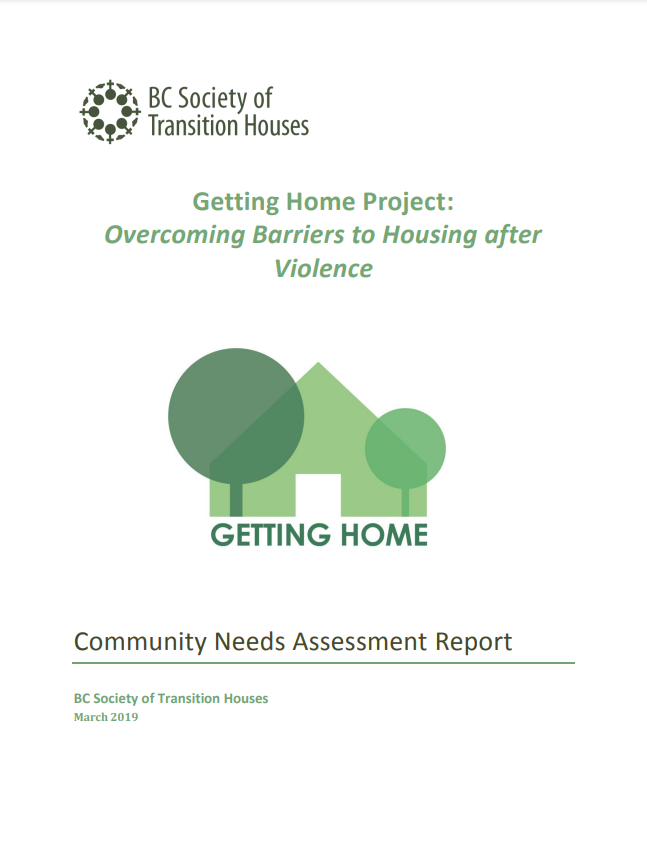3 search results
Recommendation 1:
Prioritizing affordable housing is essential for poverty reduction and economic security of women experiencing violence.
This community needs assessment and review of the academic and grey literature clearly shows that women experiencing violence face many challenges to securing affordable housing, with the most foundational barrier being unaffordability of housing and chronic poverty. Women experiencing violence need to find housing that is actually affordable (no more than 30% of her income) so that they are able to avoid a cycle of poverty.
We recommend that all levels of government commit to building adequate and affordable housing that fits the needs of women and their children experiencing violence.
This community needs assessment and review of the academic and grey literature clearly shows that women experiencing violence face many challenges to securing affordable housing, with the most foundational barrier being unaffordability of housing and chronic poverty. Women experiencing violence need to find housing that is actually affordable (no more than 30% of her income) so that they are able to avoid a cycle of poverty.
We recommend that all levels of government commit to building adequate and affordable housing that fits the needs of women and their children experiencing violence.
-
Category and theme:
Audience:
Recommendation 2:
The National Occupancy Standards should not be used to exclude safe options for women experiencing violence.
As our research shows, the National Occupancy Standards are standing in the way of women accessing affordable units in social housing. Without affordable housing options, women may end up in unsafe situations. Furthermore, there is a common concern that MCFD may become involved due to the size of the unit a women is living in with her children or MCFD is unable to return children to the care of their mother from foster care because she is not able to obtain a big enough unit. The NOS are intended to address habitability and overcrowding issues but as applied as requirements by relevant housing and social service agencies, the unintended consequence is to keep women in unsafe circumstances and limit their freedom to access safe and affordable housing.
We recommend that CMHC clarify that the NOS are guidelines, not regulation and that safety should be established as the main priority for housing women and their children, not number of bedrooms.
As well, we recommend that MCFD educate their workforce so that the National Occupancy Standards are not used as justification for separating women and her children.
As our research shows, the National Occupancy Standards are standing in the way of women accessing affordable units in social housing. Without affordable housing options, women may end up in unsafe situations. Furthermore, there is a common concern that MCFD may become involved due to the size of the unit a women is living in with her children or MCFD is unable to return children to the care of their mother from foster care because she is not able to obtain a big enough unit. The NOS are intended to address habitability and overcrowding issues but as applied as requirements by relevant housing and social service agencies, the unintended consequence is to keep women in unsafe circumstances and limit their freedom to access safe and affordable housing.
We recommend that CMHC clarify that the NOS are guidelines, not regulation and that safety should be established as the main priority for housing women and their children, not number of bedrooms.
As well, we recommend that MCFD educate their workforce so that the National Occupancy Standards are not used as justification for separating women and her children.
-
Category and theme:
Audience:
Recommendation 3:
Partnerships are vital to reducing barriers for women experiencing violence.
Many of the barriers that women face in finding affordable long term housing can be reduced through partnerships across sectors and awareness building about the impacts of violence against women. While affordability and availability of housing are major barriers for people impacted by increasing unaffordability in BC, women experiencing violence face additional specific barriers due to their circumstances. We can see that barriers such as a lack of references, access to childcare or understanding their housing options are obstacles that can be better solved with partnerships.
We recommend that this project continues to build partnerships between transition houses, government, and the housing sector to help address and work towards improving these types of barriers.
Many of the barriers that women face in finding affordable long term housing can be reduced through partnerships across sectors and awareness building about the impacts of violence against women. While affordability and availability of housing are major barriers for people impacted by increasing unaffordability in BC, women experiencing violence face additional specific barriers due to their circumstances. We can see that barriers such as a lack of references, access to childcare or understanding their housing options are obstacles that can be better solved with partnerships.
We recommend that this project continues to build partnerships between transition houses, government, and the housing sector to help address and work towards improving these types of barriers.
-
Category and theme:
Audience:
